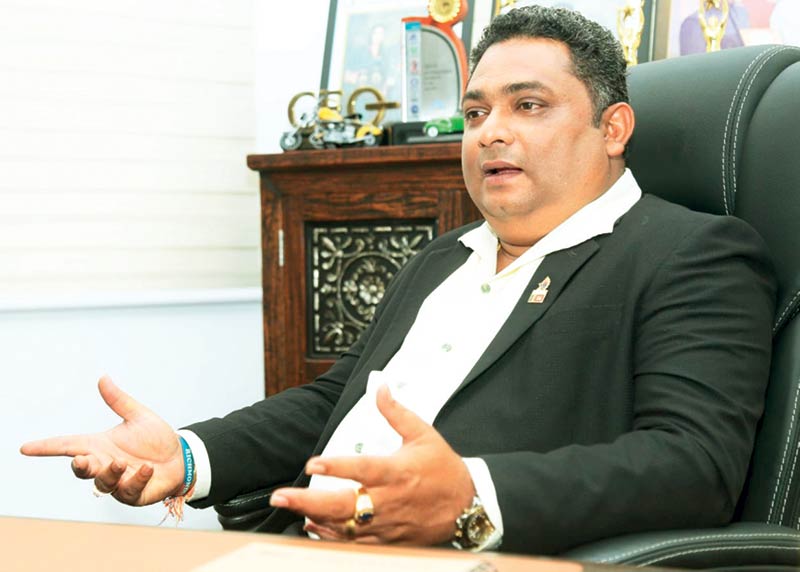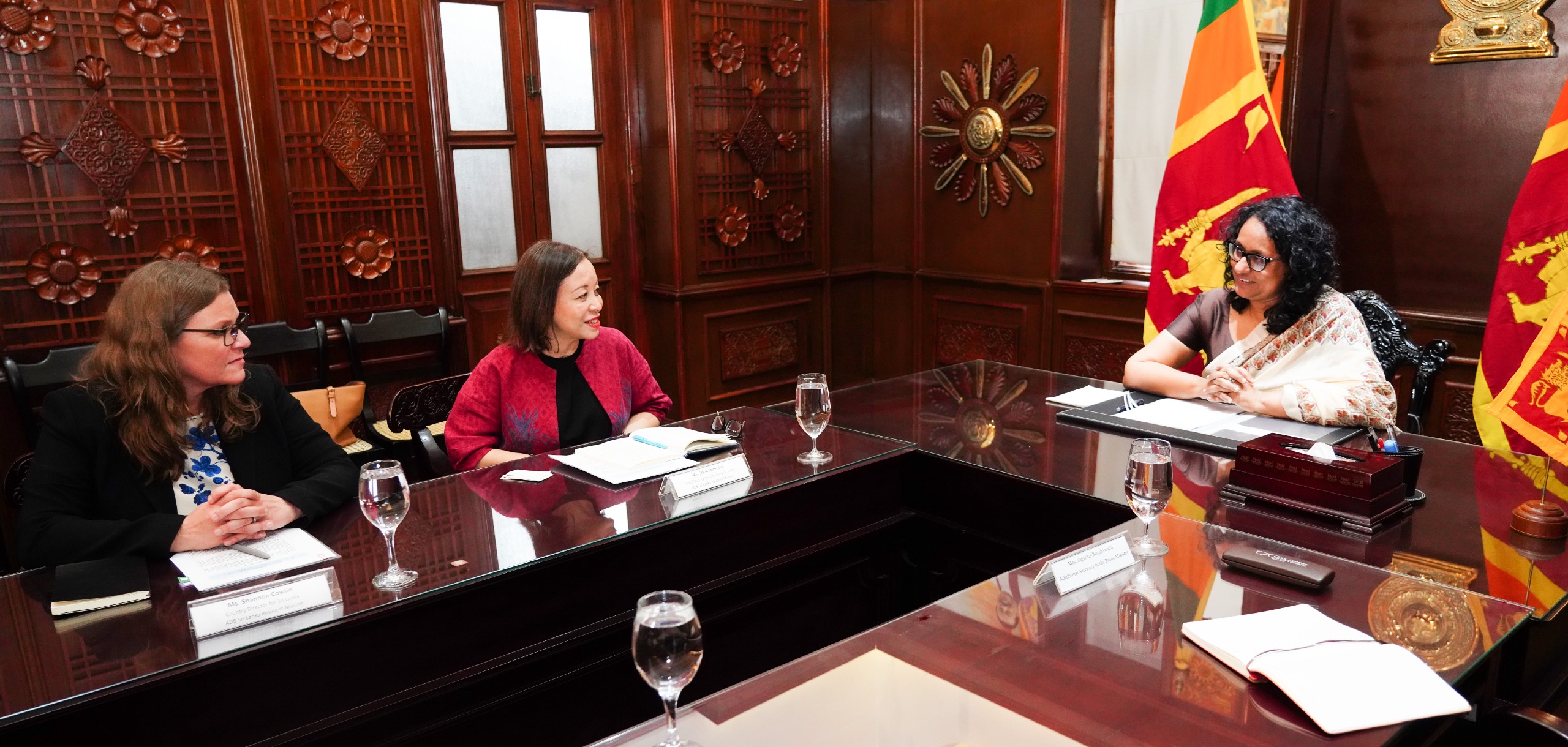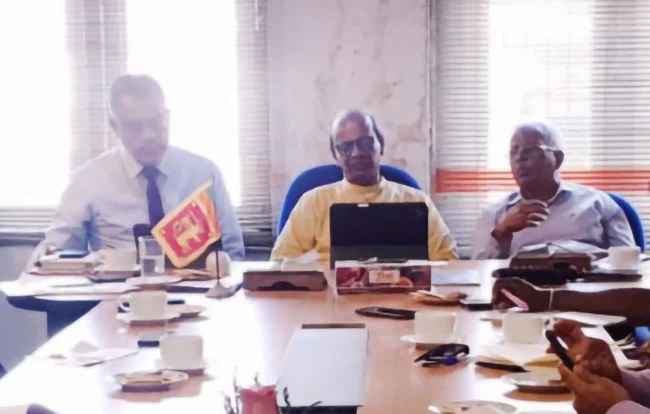Business
The Rise of Aviyana: Sri Lanka’s luxury hospitality revolution

By Saman Indrajith
As Sri Lanka ushers in 2025, the nation prepares to unveil a game-changing addition to its hospitality landscape—Aviyana Ceylon, the country’s first seven-star luxury hotel. Situated amid the serene hills of Udispattuwa, Kandy, this extraordinary property promises to set a new global benchmark for opulence and innovation. Spanning 24 acres with a masterfully designed balance of wellness and bespoke experiences, Aviyana offers an unparalleled blend of tranquility and adventure, crowned by breathtaking views of the Knuckles Mountain Range.
“Aviyana Ceylon is not just a hotel; it is a gateway to Sri Lanka’s future as a global leader in luxury hospitality. This year, we welcome the world to discover the extraordinary – a legacy that celebrates both innovation and our nation’s rich cultural heritage,” said Dr. Thisara Hewawasam, Chairman of Aviyana during an interview with the Sunday Island.
Excerpts of the interview:
Q: What inspired you to create Sri Lanka’s first seven-star luxury hotel, Aviyana Ceylon, and how do you see it reshaping the country’s hospitality landscape?
A: Tourism in Sri Lanka dates to the arrival of Prince Vijaya, followed by centuries of foreign visits driven by trade. However, in modern times, there’s been a shift towards offering more than just basic accommodation for tourists. While Sri Lanka attracts around two million visitors annually, spending an average of USD 2,000 each, countries like the Maldives see tourists spending up to USD 5,000. To bridge this gap, I believe Sri Lanka needs a new kind of luxury experience.
We currently lack facilities that cater to high-net-worth individuals. The star hotels in Sri Lanka, typically charge between Rs 15,000 and Rs 75,000 per night, while few top-tier hotels charge over Rs 200,000. To attract ultra-wealthy tourists, we need a seven-star hotel that offers unparalleled luxury, combining all the best facilities under one roof.
Aviyana Ceylon is designed with this vision in mind: to raise the average income from foreign guests and contribute to the local economy. Many feared this ambitious project would fail, especially since most leading hotels here are international chains. However, our focus is on promoting Sri Lankan culture, wellness, traditional medicine, and Ayurveda, which will strengthen our identity in the hospitality industry. This marks a pivotal moment for Sri Lanka’s tourism.
Q: Aviyana Ceylon, nestled in the hills of Kandy, emphasizes wellness and bespoke experiences. How does the hotel blend Sri Lanka’s cultural heritage with modern luxury?
A: There are two key factors when creating a memorable resort experience: the facilities provided and the location’s offerings. At Aviyana Ceylon, we excel in both. While other hotels, like Mount Lavinia, boast a heritage and coastal view, Aviyana’s location is unique. It offers a sweeping view of one-tenth of Sri Lanka’s land area, spanning five districts. This breathtaking scenery is complemented by a diverse climate, where guests can experience five different temperatures in a single day—something no other hotel in the country offers.
Our surroundings are rich with nature—lush greenery, medicinal plants like Aralu and Nelli, and pure water from the Knuckles range, considered the cleanest in the world. The area also offers activities such as bungee jumping, bird watching, and hiking, all framed by nature’s beauty.
Beyond nature, we bring Sri Lanka’s renowned hospitality to the forefront. We celebrate our food culture by serving dishes from King Rajasinghe’s menu, where food offers both nutrition and medicinal benefits. We also embrace customer-centric service, adjusting the hotel’s offerings to suit the guest’s preferences, from security to connectivity.
Aviyana Ceylon will host traditional events weekly, featuring artists from the Dalada Perahera in Kandy. We’re also bringing world-renowned chefs who have not visited Sri Lanka before. Security is a top priority, with advanced systems ensuring the safety of all guests. The hotel includes an on-site hospital, helicopter service, and an underground area for emergencies.
Aviyana Ceylon also stands out by offering unique experiences, such as temporary ordination for Buddhist guests, access to indigenous medicine, and a dedicated hospital and helicopter service for emergencies. This fusion of luxury, culture, and wellness creates an unforgettable experience.
Q: Aviyana’s strategic partnership with the Al Nahyan Royal Family of Abu Dhabi is a significant milestone. How do you see this collaboration enhancing Sri Lanka’s global appeal as a luxury travel destination?
A: When we first approached the royal family, they viewed Sri Lanka only as a country from where they get their housemaids. To change this perception, we showed them a five-minute video showcasing the beauty and offerings of the country, which they found astonishing. This seven-star hotel concept is designed to cater to wealthy clients from Arabic countries, who have long played a key role in international trade, from the Silk Route to modern times. The Al Nahyan family has been instrumental in connecting us with high-net-worth individuals. We plan to expand our partnerships globally, reaching markets in India, the US, Europe, Russia, and other Western countries. Our vision is to host not only the royal family but also former world leaders, renowned sports figures, and artists at Aviyana Ceylon.
Q: Sustainability is often a key focus in high-end hospitality today. How does Aviyana Ceylon balance opulence with environmental responsibility, particularly in Kandy’s scenic highlands?
A: At Aviyana Ceylon, sustainability is integral to our design. We only removed 33 trees, leaving much of the 24-acre property untouched. Instead of building a massive 6,000-7,000 room hotel, we chose just eight acres for construction. We’ve also launched the ‘Breath’ project, planting 33,000 trees to date. Acknowledging the impact of carbon emissions, we invite guests to plant a tree during their visit, with their name and GPS location, so they can track its growth worldwide.
Given the hotel’s mountaintop location, we ensure no waste leaves the property. We’ve implemented an advanced Japanese waste recycling system at a significant cost. Wastewater is treated before being released into the ground. Our broader vision is to create a tourism zone in Kandy, linking local attractions like Victoria Falls, the Knuckles Range, and the Dalada Maligawa, positioning the area as a major tourism hub in the next 10-15 years.
Q: As Aviyana prepares for its grand opening, what specific features or experiences do you believe will set it apart from other luxury hotels, and what are your long-term aspirations for the brand?
A: Sri Lanka, known mainly for cricket and Ceylon tea, lacks a strong tourism brand and policy. Despite being one of the best destinations globally, we fail to leverage the opportunities tourism presents. Aviyana Ceylon aims to change that by becoming Sri Lanka’s defining luxury brand, much like cricket. We’re working with top global influencers to promote the hotel, with plans to invite one from each of 160 countries to cover our opening. With social media reach, we hope to captivate millions worldwide, offering a marketing campaign unlike anything seen before.
Our goal is to create a lasting impact not only for Aviyana Ceylon but for Sri Lanka’s tourism sector. We plan to introduce a hotline and travel insurance for all tourists to enhance their experience, benefiting the entire industry.
As we near completion of the seven-star hotel, we expect heads of state from Arab countries to attend our opening. With the government’s support, we anticipate a 20% boost in tourism revenue and increased hotel prices in Colombo. Looking ahead, we’re also planning the Aviyana-2 project, with a world-first gem showroom and hospital, bringing Sri Lanka’s pride to the global stage.
Business
Newly appointed ADB Country Director to Sri Lanka and delegation meet PM

The newly appointed Country Director of the Asian Development Bank for Sri Lanka Ms Shannon Cowlin and the accompanying delegation met with Prime Minister Dr. Harini Amarasuriya on Tuesday [0th of February] at the Prime Minister’s office.
Welcoming the delegation, the Prime Minister extended congratulations to the newly appointed Country Director and acknowledged the long-standing partnership with the Asian Development Bank. The Prime Minister also expressed appreciation for ADB Bank’s continued engagement and support aligned with Sri Lanka’s national development priorities.
The Prime Minister also conveyed gratitude for the timely assistance extended by the ADB in response to Cyclone Ditwah, noting the importance of such support in mitigating the immediate impacts of natural disasters.
The ADB delegation reiterated its readiness to further assist Sri Lanka during the post-cyclone recovery phase, including rebuilding and reconstruction efforts, and emphasized its commitment to the supporting the education sector.
The meeting was attended by OIC / Deputy Director General, SARD Ms. Sona Shrestha, Ms. Cholpon Mambetova Country Operations Head of ADB Sri Lanka Mission Resident, Additional Secretary to the Prime Minister Ms. Sagarika Bogahawatta, Director General of the External Resource Department, Ministry of Finance Samantha Bandara, Director for ADB Division in External Resource Department, Ministry of Finance Ranjith Gurusinghe.
[Prime Minister’s Media Division]
Business
‘Bad Bank,’ Big Stakes: Sri Lanka’s Rs. 300bn gamble on growth

Sri Lanka’s small and medium enterprise (SME) sector—responsible for 52 percent of GDP and employing nearly half the national workforce—has become the next decisive test of the country’s fragile economic recovery.
A proposal to establish a Rs. 300 billion “Bad Bank” to absorb distressed SME loans now places policymakers at a crossroads: act boldly to revive credit and growth, or risk entrenching stagnation in the real economy.
The Sri Lanka Chamber of Small and Medium Industries (SLCSMI) on Tuesday told journalists that they had unveiled a detailed blueprint aimed at restructuring an estimated Rs. 460 billion in non-performing loans (NPLs), much of it concentrated among SMEs battered by successive shocks—from the Easter Sunday attacks and the pandemic to sovereign default and climate-related disruptions such as Cyclone Ditwah.
While headline indicators suggest macroeconomic stabilisation, including lower inflation, improved reserves and a profitable banking sector, credit transmission to smaller enterprises remains severely constrained, Chambers think tank pointed out.
“This is not about rewarding defaulters,” said SLCSMI President Prof. Rohan De Silva. “It is about protecting the productive backbone of the economy. If SMEs collapse, the consequences will extend far beyond individual balance sheets.”
Despite strong liquidity and a return to profitability in the banking system, thousands of SMEs remain blacklisted at the Credit Information Bureau (CRIB), unable to access fresh working capital.
The Chamber argues that unless distressed assets are separated from viable enterprises, banks will remain structurally risk-averse, prolonging the paralysis in private sector credit growth.
The proposed “Bad Bank” would function as a specialised rehabilitation vehicle, purchasing or warehousing toxic SME loans and granting viable firms a five-to-ten-year restructuring window, shielded from parate execution, to rebuild cash flows. Senior Vice President Colvin Fernando described the initiative as an economic circuit-breaker rather than a bailout. “These are not failed enterprises,” Fernando said.
He added:”They are businesses hit by extraordinary external shocks. Unless we ring-fence these distressed loans, credit transmission will remain paralysed.”
The concept draws on international precedents where asset management companies were deployed after systemic crises. Yet such mechanisms succeed only when governed by strict asset valuation discipline, professional management and insulation from political interference. Without these safeguards, they risk becoming vehicles for concealed subsidies or fiscal leakage.
The most contentious element of the Chamber’s proposal lies in its funding model. It calls for a hybrid structure combining low-cost international financing, a levy on commercial bank profits and the utilisation of unutilised balances from the Employees’ Provident Fund (EPF) and Employees’ Trust Fund (ETF).
Prof. De Silva argues that the banking sector, having restored profitability partly through elevated interest margins during the crisis years, has both the capacity and systemic responsibility to contribute. “The banking system has returned to strong profitability,” he said. “A structured contribution toward SME rehabilitation is not punitive—it is an investment in systemic stability.”
The suggested mobilisation of pension fund balances, however, is likely to provoke scrutiny over governance and fiduciary safeguards, while a levy on bank profits may raise investor sensitivity in a sector that has only recently regained confidence.
Fernando acknowledged the risks, emphasising that transparency and strict eligibility criteria would be essential. “This must be professionally managed, transparent and focused strictly on viable enterprises. Without discipline and accountability, the entire purpose would be defeated,” he cautioned.
Adding urgency to the debate is the Government’s decision to lower the VAT registration threshold to Rs. 36 million annually from April 1, 2026, drawing more small firms into the tax net. The Chamber warns that tightening tax compliance while credit remains restricted could create a double squeeze. “You cannot increase tax burdens and restrict financing simultaneously without economic consequences,” Prof. De Silva observed, describing the timing as highly sensitive.
Immediate Past President Mohideen Cader underscored the scale of the stakes. With SMEs contributing 52 percent to GDP and already under severe strain, he warned that inaction would result in irreversible economic scarring.
The macroeconomic logic is clear: without restoring SME balance sheets, private investment and employment growth are unlikely to regain momentum. Yet the countervailing risk is equally apparent. A poorly designed vehicle could create moral hazard, transfer private losses onto public shoulders and introduce new contingent liabilities into an economy still emerging from sovereign default.
Sri Lanka’s IMF-backed reform programme has so far focused on fiscal consolidation and debt sustainability. The SME “Bad Bank” proposal introduces a more complex phase in the recovery narrative—one that shifts attention from stabilisation to growth. The question confronting policymakers is whether the economy can sustain recovery without unclogging the credit arteries that feed its most labour-intensive sector.
The Rs. 300 billion proposal is, in essence, a calculated gamble that repairing SME balance sheets will unlock lending, revive investment and restore economic momentum. If executed with rigour, transparency and independence, it could serve as a bridge from crisis management to expansion. If mishandled, it risks deepening vulnerabilities in a system that has only recently regained its footing. For an economy seeking to move beyond stabilisation, the stakes could hardly be higher.
By Ifham Nizam
Business
The all-new Nissan Almera has arrived

Associated Motorways (Private) Limited (AMW), a stalwart of Sri Lanka’s automotive industry, officially unveiled the all-new Nissan Almera on February 7th, 2026. The launch, held at the Nissan Showroom in Union Place, signaled a bold step forward in providing ‘market-relevant mobility solutions’ to a dicerning local audience.
Addressing the gathering, Jawahar Ganesh, Group Managing Director of AMW, highlighted the strategic engineering behind the new model.
“The all-new Nissan Almera has been thoughtfully engineered to deliver what today’s Sri Lankan customer truly values: efficiency, safety, comfort, and intelligent design,” Ganesh stated.
He further emphasised that AMW’s leadership, backed by the global expertise of the Al-Futtaim Group, remains committed to bringing world-class standards to the local market.
Echoing this sentiment, Atul Aggarwal, Director Aftersales and South Asia Business Unit for Nissan Motor Corporation, noted that the Almera is designed to offer the ‘Nissan Peace of Mind.’ He expressed confidence that the sedan would replicate the massive market success recently seen by the Nissan Magnite.
The Almera is powered by the unique HRA0 1.0-litre Turbo engine, producing 100 hp and 152 Nm of torque. This ‘flat torque’ setup ensures responsive acceleration for city driving and confident overtaking on highways. To bolster fuel economy, it features an Idling Stop system.
Inside, the cabin prioritises the “human element” with:
Quole Modure Seats: Innovative materials that reflect heat, keeping the cabin cool in the tropical sun.
Zero Gravity Seats: Ergonomically designed to reduce fatigue during long commutes.
360-degree Safety Shield: A comprehensive suite including an Around View Monitor, Blind Spot Warning, and Lane Departure Warning.
With immediate stock availability and flexible financing via AMW Capital Leasing, the Almera is positioned as the premier choice for professionals and families seeking a smart, refined, and safe driving experience.
Although AMW did not announce pricing at the event, sources told The Island Financial Review that the new sedan will retail in the LKR 12.5–13 million range. Early birds are in for a win, too, with an encouraging discount reserved for the first 100 buyers.
Notably, the event was a departure from typically lengthy automotive launches, the Almera ceremony was a masterclass in simplicity. The entire event concluded in just twenty minutes – comprising a 15-minute preamble and speeches, followed by a five-minute ceremonial reveal as the Almera glided into the auditorium.
Participants described the event as ‘short and sweet,’ a sentiment that aligned perfectly with the ‘C-word’ emphasised by Jawahar Ganesh, Group Managing Director of AMW about the Nissan brand: Credibility.
By Sanath Nanayakkare
-

 Features5 days ago
Features5 days agoMy experience in turning around the Merchant Bank of Sri Lanka (MBSL) – Episode 3
-

 Business6 days ago
Business6 days agoZone24x7 enters 2026 with strong momentum, reinforcing its role as an enterprise AI and automation partner
-

 Business5 days ago
Business5 days agoRemotely conducted Business Forum in Paris attracts reputed French companies
-

 Business5 days ago
Business5 days agoFour runs, a thousand dreams: How a small-town school bowled its way into the record books
-

 Business5 days ago
Business5 days agoComBank and Hayleys Mobility redefine sustainable mobility with flexible leasing solutions
-

 Business2 days ago
Business2 days agoAutodoc 360 relocates to reinforce commitment to premium auto care
-

 Business6 days ago
Business6 days agoHNB recognized among Top 10 Best Employers of 2025 at the EFC National Best Employer Awards
-

 Business6 days ago
Business6 days agoGREAT 2025–2030: Sri Lanka’s Green ambition meets a grid reality check













